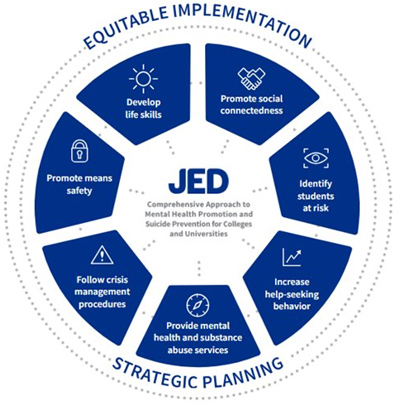
JED Campus at UHCL
What Does It Mean To Be a JED Campus?
The JED Campus program, a nationwide initiative by The JED Foundation (JED), collaborates with colleges and universities to enhance their existing student mental health, substance use, and suicide prevention efforts. Through tailored support, JED guides these institutions in developing comprehensive systems, programs, and policies. Through this 18 month process, JED will help UHCL take a systematic and evidence-based review of how we can improve the emotional health and wellbeing of our students and decrease suicides. JED Campus signifies that we are putting systems, programs, and policies in place to enhance our existing culture of mental health and wellness.
What is The JED Foundation? (YouTube)

Why JED and Why Now?
- Formally establish a baseline of where our faculty, staff and students are in relation to mental health and well-being programming, resources and care options.
- Foster a connected university community that openly supports the mental health and well-being of peers and colleagues.
- Create consistency across the university through collaborative responses and policies related to prevention, awareness and crisis mitigation.
- To take a proactive approach to mental health.
JED Working Groups
Consistent with The JED Foundation's recommendations, working groups were formed for areas of action. These areas are being explored by members of the JED steering committee which include UHCL faculty, staff, and students to address the needs of the campus community. The workgroups have identified potential areas for action, and the University is committed to the ongoing efforts in wellness and suicide prevention that meet the changing landscape of collegiate mental health. If you’re interested in knowing more about the JED campus initiative or would like to join a workgroup please contact our chair persons directly by e-mailing Dr. Matthew at Matthew@uhcl.edu or Dr. Cook at cookc@uhcl.edu.
Working Group 1: Crisis Management, Means Safety and Postvention Workgroup
- Create Postvention Plan
- Environmental Scan and means safety options
- Means safety refers to an evidence-based suicide prevention practice that involves making a suicide attempt method less available or more difficult to access immediately, therefore less likely to cause a fatal suicide attempt. Putting time and space between someone experiencing suicidal thoughts and their access to lethal means.
- Develop/refine a family notification policy to be used in emergency situations
Working Group 2: Policy and Process
- Write out CARE response plan
- Family Notification policy
- Medical leave and return to campus policies (Leave of Absence)
- Student Health Insurance Policy and Treatment (substance abuse)
- Consider usage of a medical history intake form for all new students
- Review Alcohol and Drug policy (reviewing Student Handbook)
- Explore Tuition Insurance policy options
- Explore Medical Amnesty policies
Working Group 3: Health and Wellbeing
- Develop peer ambassador program
- Enhance messages to new incoming students and families about services and resources on campus
- Increase mental health screenings and substance use awareness activities, wellness days
- Consider additional screening for mental health in primary care
Working Group 4: Communications and Campaigns
- Create webpage for JED process and progress
- Develop campaigns to promote access to suicide prevention/crisis numbers
Working Group 5: Student Engagement and Connection
- Develop steps to help identify disconnected/isolated students
- Develop or enhance programs and activities to promote connection and inclusion of disconnected/isolated students on campus
- Conduct inventory of life skills programming done on campus to help cross promote and collaborate
Additional Resources
- National Suicide Hotline: 988
- Crisis Textline: Text HOME to 741741
- Gay and Lesbian Switchboard Houston: 713.529.3211
- National Domestic Violence Hotline: 800.799.7233
- National Sexual Assault Hotline: 800.656.4673
- Nearby Medication Disposal: CVS 2469 Bay Area Boulevard Houston TX 77058 281.486.0613
-
Naloxone: Naloxone is a medication that rapidly reverses opioid overdose by binding to opioid receptors and blocking the effects of opioids. It is commonly used in emergencies to restore normal breathing in individuals experiencing an overdose from drugs like heroin, fentanyl, or prescription opioids. UHCL has several locations on campus where Naloxone can be used if needed.
Naloxone Locations on campus
- STEM: 1st, 2nd, and 3rd floor on the left side of the main elevator
- Bayou: 1st, 2nd, and 3rd floor on the right side of the main elevator (west entrance)
- SSCB: 2nd floor near elevator
- Arbor Central: Main hallway on the right side walking from Arbor North
- Delta: Main entrance on right side
- FMC: Rear hallway, on the right side near the car shop’s double doors
- Hunter Hall: 1st, 2nd , 3rd, and 4th floor on the right side of the elevator (south entrance)
- Pearland – Health Science Bldg.: 1st floor ( near custodian closet, room 108) and 2nd floor (near room 210)
- Pearland – Health Science Bldg.: 1st floor ( near custodian closet, room 108) and 2nd floor (near room 210)
- Each Police Officer keeps naloxone on their persons.






